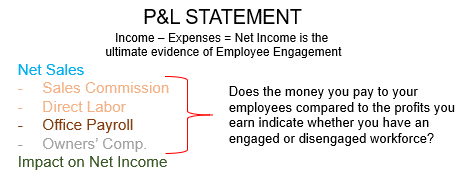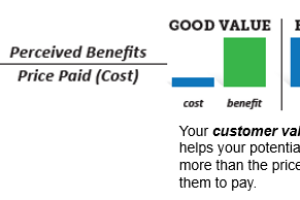
How people must work together to deliver your products and services either contributes to business sales and profits or it doesn’t.
Businesses with engaged employees are better positioned to attract and retain talent, improve quality and productivity, inspire innovation, and increase customer satisfaction. Do this, and you will make more money. Don’t, and you will make less.
Overview
A company that delivers outstanding business results has aligned employee behaviors that lead to superior sales and profits. If you believe you can improve business results through your people, engagement is a way to do that. Engagement is not a survey. It is not a measure of satisfaction showing where to improve your business results through your people.
Technically, engagement is defined as an employee’s emotional and intellectual involvement with their employer. Disengaged people want to work elsewhere, talk negatively about their employer, and contribute the minimum required to stay employed.
The difference between doing only what one is told and required to do, which is compliance, and engagement, which is doing what one is told and required to do, plus what one sees needs getting done. Engagement adds this discretionary effort to compliance.
Engagement is ultimately a reflection of commitment. It goes beyond how much “I like things here” to how much “I want to be here. Those who want to be in your business are more likely to step up and help improve your business results. Employees who are engaged consistently demonstrate three different behaviors.
Engaged employees:
- Are aware of how their work impacts the customer and business results, will
- Say great things about their employer, and
- Have a sense of accomplishment in their work.
The most common levers available to management to influence employee engagement involve areas that impact what it’s like to work at a company, referred to as the “employment experience.”
- Work activities are seen to matter to the business
- Relationship with supervisor and coworkers
- Total compensation reflective of pay, benefits, and rewards
- Senior management of the company models values and culture
- Belief in the direction leadership is taking the company
When employees understand what is expected of them and what they can expect in return, it creates a “win-win” situation. Investors win because customers are returning because employees are engaged in serving the needs and satisfying the wants of customers as efficiently as possible.
Start to improve your employee engagement by actively hearing what employees think, telling them what it is, helping them see how they contribute, and keeping them aware of what’s working and where the business is getting stuck.
For most businesses, the single greatest sustainable source of advantage is the people employed in the business. What matters then is the behavior of those employees to produce planned results. Clear evidence exists that employee behavior drives customer behavior, and customer behavior drives business performance. Having a work environment that inspires the right attitudes and behaviors of all employees is the best way to make more money in both the near, short, and long term.
